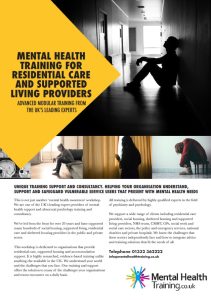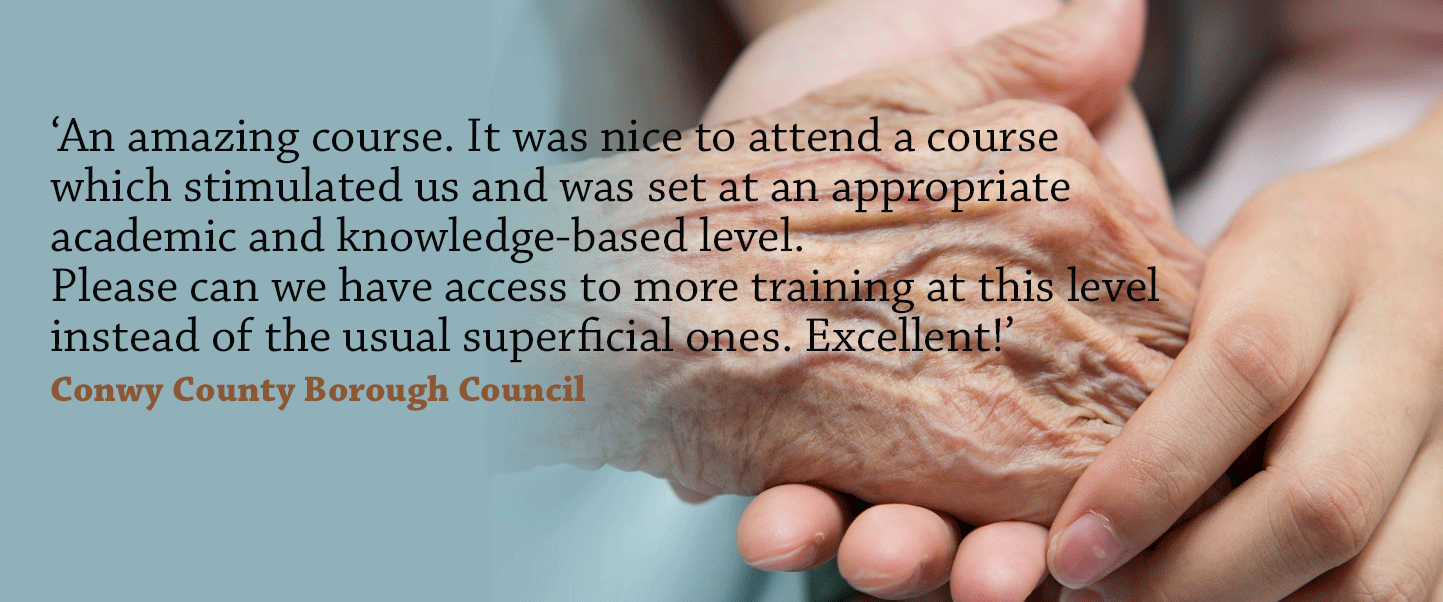This is a unique training event dedicated to the learning needs of social housing / sheltered housing providers.
 This is not just another ‘mental health awareness’ workshop. This workshop is dedicated to organisations that provide housing and accommodation support. It is highly researched, evidence-based training unlike anything else available in the UK.
This is not just another ‘mental health awareness’ workshop. This workshop is dedicated to organisations that provide housing and accommodation support. It is highly researched, evidence-based training unlike anything else available in the UK.
Please click the leaflet to download a PDF overview of the training course
We are one of the UKs leading expert providers of mental health support and abnormal psychology training and consultancy. We’ve led from the front for over 20 years and have supported many hundreds of social housing, supported living, residential care and sheltered housing providers in the public and private sector.
Mental Disorder In Social Housing, Sheltered Housing and Supported Living 10 Key learning objectives:
1 – Recognise mental disorder in tenancies and fine-tune support, advocacy and safeguarding. Understand the impact of psychiatric disorder on tenant wellbeing with a key focus on :
- Stress-related conditions
- Mood disorders including
Major Depression and Bipolar Disorder - Anxiety-related disorders
- Schizophrenia and chronic psychosis,
- EUPD / Personality disorder diagnosis
- Antisocial / Dissocial & Psychopathic Personality Disorders
- Dementia and delirium,
- Recognising mental disorder in antisocial behaviours,
- Substance misuse and dual diagnosis.
- Neurodiversity including Autism & ADHD
- Hoarding & Self Neglect Behaviours
- Alcohol-related Mental Health Disorders
The training also focuses on behaviours that are not commonly associated with enduring or complex mental disorder.
2 – Understand the specific challenges and safeguarding factors interwoven into personality disorder psychiatry. Improve communications, relationships, safeguarding, boundaries, advocacy and general guidance.
3 – Understand the complex issues surrounding self-harm and suicide and develop appropriate assessments, safeguarding, conversational responses and safety planning strategies.
4 – Understand the responsibilities and limitations of the local NHS / CMHT, Crisis Teams & Adult Social Care. Understand capacity arguments, the functions of the Mental Health Act and now how improve engagements and safeguarding responses.
5 – Understand how to support and signpost vulnerable tenants into the healthcare system more effectively, including dual diagnosis / illicit substance misusing tenants.
6 – Understand best practice in motivating tenants to engage with your support and expectations and how to minimise poor engagement and unhealthy behaviours.
7 – Understand risks associated with forensic mental health profiles, improve and implement risk assessments, improve lone working safety and the safe management of hostile conflict.
8- Better understand and manage / safeguard behaviours associated with hoarding and self neglect. Know how and when to escalate concerns to social services and safeguard vulnerable tenants and challenge capacity arguments.
9 – Understand and implement reasonable adjustments as required by the Equality Act 2010. Understand and recognise primary and secondary gain behaviours and know when and where to challenge non-compliance.
10 – Improve risk assessments and risk management protocols for lone working staff and improve staff safety through an increased knowledge of forensic mental health risk.
Training dedicated to Mental Health in Residential Care & Supported Living.
 This workshop is dedicated to organisations that provide residential care, supported housing and accommodation support. It is highly researched, evidence-based training unlike anything else available in the UK.
This workshop is dedicated to organisations that provide residential care, supported housing and accommodation support. It is highly researched, evidence-based training unlike anything else available in the UK.
We understand your world and the challenges that you face. Our training and support offers the solution to many of the challenges your organisations and teams encounter on a daily basis.
Please click the leaflet to download a PDF overview of the training course
Typical tailored content
- Better recognise and understand mental disorder and fine-tune support, advocacy and safeguarding.
- Understand the impact of psychiatric disorder on service user wellbeing with a key focus on:
- Stress-related conditions
- Mood disorders including
Major Depression and Bipolar Disorder - Anxiety-related disorders
- Schizophrenia and chronic psychosis,
- EUPD / Personality disorder diagnosis
- Dementia and delirium,
- Recognising mental disorder in antisocial behaviours,
- Substance misuse and dual diagnosis.
- Neurodiversity including Autism & ADHD
- Alcohol-related Mental Health Disorders
- Improve communications, relationships, safeguarding, boundaries, advocacy and general guidance.
- The training also focuses on behaviours that are not commonly associated with enduring or complex mental disorder
- Understand the complex issues surrounding self-harm and suicide and develop appropriate assessments, safeguarding, conversational responses and safety planning strategies
- Understand the responsibilities and limitations of the local NHS / CMHT, Crisis Teams & Adult Social Care
- Understand capacity arguments, the functions of the Mental Health Act, Mental Capacity Act and Best Interests Decisions
- Understand how to support and signpost vulnerable service users into the healthcare system more effectively, including dual diagnosis / illicit substance-misusing tenants
- Understand best practice in motivating individuals to engage
- Understand risks associated with forensic mental health profiles, improve and implement risk assessments, improve lone working safety and the safe management of hostile conflict
- Better understand and manage / safeguard behaviours associated with hoarding and self neglect. Know how and when to escalate concerns to social services and safeguard vulnerable tenants and challenge capacity arguments
- Understand and implement reasonable adjustments as required by the Equality Act 2010. Understand and recognise primary and secondary gain behaviours and know when and where to challenge non-compliance
- Improve risk assessments and risk management protocols for lone working staff and improve staff safety through an increased knowledge of forensic mental health risk.
Training facilitators:
This training is delivered by facilitators trained in psychiatry and specialise in general psychiatric illness and abnormal psychology, personality disorder and stress-related illness training, We offer a wide-ranging, multi-disciplinary knowledge and skills with high quality, integrated evidence-based training that you can trust.


